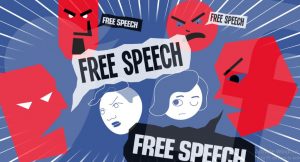Use & Abuse

Freedom of speech and expression is the soul of democracy and to rob an individual of that fundamental right is to undermine the basic tenets of democracy. But, does that give a carte blanche to a citizen to articulate in public what she or he thinks and feels about issues pertaining to public life? It is often said freedom entails certain responsibilities and one must exercise restraint while speaking one’s mind so as not to hurt or disrespect other’s feelings and sentiments. The question, however, is where lies the borderline between freedom of speech and restraint in exercising that freedom. In fact, no one on earth has yet been able to decipher what exactly may be construed as ‘freedom’. Each person has to demarcate and draw the line or limit. It is like walking up to a precipice and then deciding whether to go forward and fall or to step back and stay within limits.
It surely is a grey area and individuals and state powers often tend to make use of it by either misusing the licence that the right to free speech gives or muzzling a voice the ruling dispensation perceives to be too critical of government policies and actions. India has been experiencing the phenomenon for decades, but the situation has become far more complex now in the digital age, when one can reach a wide audience by a single post on social media.
The Supreme Court on 14 July said citizens must know the value of freedom of speech and expression and observe self-regulation. The Court did not stop there and spoke of mulling guidelines to regulate offensive posts on social media. A Bench comprising Justices BV Nagarathna and KV Viswanathan was hearing a plea of an individual, Wazahat Khan, booked in FIRs in several states, including West Bengal, for his objectionable posts on X against a Hindoo deity. On 23 June, the top court granted him interim protection from coercive action till 14 July. Interestingly, Khan had filed a complaint against another social media influencer Sharmistha Panoli for allegedly making communal remarks in a video. A saying goes: One man’s meat is another man’s poison. This seems to be super relevant in today’s world where everyone is getting extremely sensitive and incapable of glossing over criticism.
Justice Nagarathna iterated that citizens must know the value of the fundamental right of freedom of speech and expression. She said the State is justified in stepping in when there are cases of violations, even though State actions may not always be palatable to any freedom-loving individual. The Bench also made the pertinent observation that all divisive tendencies noticed on social media these days have to be curbed, while insisting that it did not mean censorship.
“There should be fraternity among citizens,” the Bench said. It underlined the reasonable restrictions under Article 19 (2) of the Constitution on freedom of speech and expression, saying they had “rightly been placed.”
The Bench, in the meantime, extended interim protection from arrest to Khan till the next hearing in the case and asked the counsel to assist the Bench in dealing with the larger issue of self-regulation of freedom of speech and expression of citizens.
The right to free speech is an issue even the apex court has often found too complex to handle, articulating its legal interpretations through various judicial voices and approaches. Some recent cases point to such a conclusion. On 28 March 2025, a Bench of former Justice AS Oka and Ujjal Bhuyan quashed an FIR filed against MP Imran Pratapgarhi for reciting an Urdu poem that allegedly promoted enmity between communities under Section 196 of the Bharatiya Nyay Sanhita (BNS), 2023. The Bench emphatically noted that the poem did not promote communal tension, by any “stretch of imagination.” The judgement also noted that a police officer must keep Article 19(1)(a) of the Constitution and its reasonable restrictions in mind while interpreting the text.
A couple of months later, a Bench of Justices Surya Kant and NK Singh granted interim bail to Ashoka University Professor Ali Khan Mahmudabad, who had been arrested for online posts concerning Operation Sindoor. But the bail order included conditions gagging Mahmudabad from making any online posts, articles, or oral speech related to the military operation.
A few weeks after the Mahmudabad order, the release of Kamal Haasan’s film Thug Life was obstructed in Karnataka following his comments on the Kannada language. The Karnataka High Court asked the actor to tender an apology. When the matter came to the Supreme Court, a Bench comprising Justices Bhuyan and Manmohan pointed out that an extrajudicial ban on a movie was illegal and did not countenance the order on tendering apology.
Free speech is indeed a complex issue and pronouncements from the seats of judgement are to be watched with a mixture of hope and consternation.
News